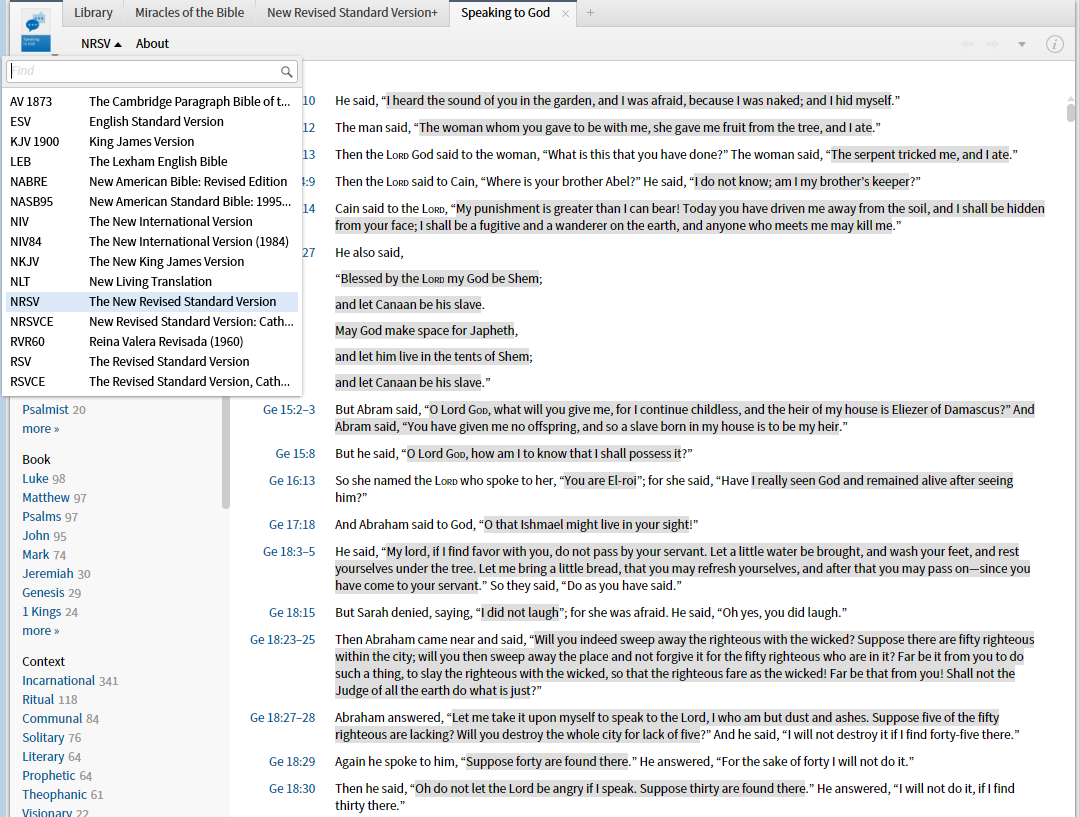1.The Speaking to God Interactive is a Logos Now feature that opens in the normal interactive ways. It is documented in the About button.

The data about each event is available for faceted searching. It includes:
[quote]
This interactive resource contains a table of information selectable by facet. The available information includes:
- Type: The type of speech
Monologue: Involving a speaker and a hearer
- Dialogue: Involving speakers in turn
- Soliloquy: Involving only a speaker
Addressee: A divine person that is part of the Trinity
Speaker: The person or entity addressing God
Context: The context of the speech
Communal: Public expression not categorized as liturgical
Incarnational: Special subset of theophany for Jesus' time on earth
Literary: Speech “to” God used as a literary or rhetorical device
Prophetic: Oracular experiences not categorized as visions
Ritual: Part of a ritual, cultic, or other religious exercise
Solitary: Personal prayer or music expressed in private
Theophanic: A dialog with a manifested presence of God
Visionary: A visionary or dream dialogue with God
Other: Not otherwise categorized
Distance: The physical proximity of the speaker and hearer
Abstract: Hypothetical speech or soliloquy
Local: The hearer is present with the speaker
Remote: The hearer is not present with the speaker
Mode: The mode of speech
Address: Spoken monologue to a passive audience
Conversation: Give and take between multiple dialogue participants
Meditation: Introspection or reflection
Music: Sung monologue sometimes involving instruments
Prayer: A remote spoken dialogue directed to God
Content: The content of the speech
Affirmation: Expression of agreement, especially “amen”
Blessing: Uses the formula “bless/blessed”
Complaint: Report of a specific grievance
Confession: Confession of faith; the speech act portion of salvation
Consecration: A kind of oath where one is set apart for divine service
Curse: Uses the formula “curse/cursed”
Imprecation: Request for justice or vengeance to come down on another
Intercession: Request on behalf of another
Lament: Expressing negative emotion
Oath: A promise, vow, covenant, or other swearing
Petition: Request for a specific consideration for oneself
Praise: Ascribing glory, adoration, worship, or recounting good deeds
Query: Request for information or direction
Repentance: Confession of sin; the speech act portion of repentance
Response: The rejoinder to a question or call
Thanksgiving: An expression of gratitude
Other: Not otherwise categorized
Places, Things: Places and things implicitly or explicitly associated with passages that record speaking to God
Theme: Themes or topics associated with passages that record speaking to God
Literary Type: Literary types associated with occurrences of speaking to God
2. The main page includes the faceted filter on the left - alphabetic or count sequence, the Bible reference and the Biblical text. The translation defaults to your highest priority Bible but is settable via a dropdown menu.

3. When one looks at the Context Menu one does not find a special Label with the associated data but one does find the speaker and addresses tags.

4. The facets work in the usual manner - being able to be added one per facet and deleted either one facet at a time or all facets. Available facets are:
Type
Addressee
Speaker
Book
Context
Distance
Mode
Content
Place
Thing
Theme
Literary type
